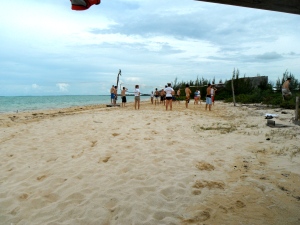 The following is a Cacique update written by Blake and Joe from Tuesday, July 5th:
The following is a Cacique update written by Blake and Joe from Tuesday, July 5th:
Although our day began with an exhausting run-swim, the greatest challenged we faced today was learning the harsh reality of how our food is processed in the United States. At The Island School, the core question that has defined our summer term is “How do we live well in a place?” Throughout the summer, our daily experiences have helped to shape our answers to that question. Today was no exception.
For those of us who had Human Ecology in the morning, we began our informative class by visiting the Island School farm. Our challenge of the day was to clip the wings off of the ducks to prevent them from flying away from the farm. I admit that this task was not an easy one. As students entered the squalid pen, ducks became alarmed by our intrusion into their home, scrambling to break away. One by one, we clipped their feathers, while leaving the first two feathers on each side. As I cut the feathers off of each of the ducks, I began to question my sense of morality.
During the afternoon, the second group of human ecology got the chance to have a very similar experience in the aquaponics lab. As I stared into the murky brown water of the tank, I could see nothing, yet was still being urged on to catch these fish that were apparently in there. As I put my net down and pulled it up, sure enough there was a thrashing tilapia in my net and I very quickly put in the bucket. As we progressed to the lab, we experienced the cleaning of the fish, which was needless to say fascinating to see how we get our food. I was eating an animal that was alive a mere 30 minutes ago. Fresh, to say the least. The experience of seeing my food before my eyes be cut up into a meal, made me appreciate The Island School’s approach of locally and sustainably having food at our fingertips. However, I would learn later in the day that not all our food was like this. I realized that the handling of animals at The Island School was far more ethical than that on big American corporal farms. Our exposure to the local farm led us into watching the informative documentary of Food, Inc.
I couldn’t believe what I was watching on the screen. Only minutes ago, I was on the local Island School farm where animals had enough space to roam, could eat food that was free of chemicals and hormones, and could gaze towards the beaming sun. In the farms, animals were fed chemicals that allowed them to grow twice as big as their usual size. The animals were packed into dark, cramped rooms so they would be able to lay more eggs. The humanness of The Island School farm was no reality for the majority of the animals harvested in our country’s commercial farms that we consume in our daily diet. A few huge companies have monopolized the food industries, affecting the lives of poorer families. Minorities are more likely to contract diabetes because they cannot afford to buy healthy food and instead have resorted to fast food. Only a day ago, I was celebrating the birth of a country that represented the land of the free, yet many citizens struggle from the injustices of the food industry. As I watched the movie, my mind turned the question “How do we live well?”
Living well is questioning where our food comes from. Living well is conserving our intake of animals, so we can receive only enough to satiate our needs. Living well is respecting the animals in our surrounding environment. Living well is eating locally. I hope that humans, as we are at The Island School, can learn to live sustainably in a world of balance and respect.




